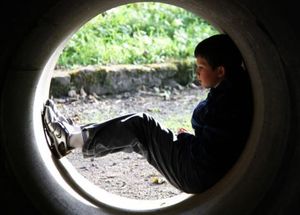Bedwetting, or enuresis, is the act of involuntarily wetting the bed while sleeping. More prevalent in boys than girls, there are several reasons why boys wet the bed, including physical and emotional causes. There are certain medical conditions that may prevent a child from using the bathroom during the night, but these are not the most common forms of bedwetting that impact children over the age of 5. If a boy who is at least 5 years old not only wets the bed at night, but also has trouble holding the bladder during the day, he should be seen by a physician to rule out any underlying medical conditions.
It should be noted that according to the “Doctor’s Guide to Natural Medicine” by Dr. Paul Barney, bedwetting is common in children up to the age of 5, and an estimated 7 million children suffer from bedwetting. Determining the causes of bedwetting is vitally important, as it will help parents and caregivers find an end to this frustrating condition.
Once medical conditions have been ruled out, there are two causes of bedwetting. These are physical or emotional. In some boys, the nervous system remains underdeveloped, and that, combined with heavy sleeping, makes it difficult for the child to wake during the night and relieve himself. There is also evidence showing that bedwetting runs in families, or is hereditary, which also lend credence to the possibility that an underdeveloped nervous system is to blame.
Among the most common causes of bedwetting in boys that are healthy children and without any physical conditions, or emotional or psychological disorders, drinking liquids past 6:00 pm is often the culprit. One of the easiest and most effective ways to prevent bedwetting is to limit drinks after 6:00 pm. When children are overtired, have had an active day and drink heavily at night before sleeping, there is a greater risk they will wet the bed. For many, limiting drinks past 6:00 pm is effective in stopping bedwetting entirely.
For other children, the cause may be indicative of an underlying emotional condition. It isn’t uncommon for children to suffer bedwetting during times of undue stress. A sudden change in a routine or within a family, such as a death, divorce or even the addition of a new sibling may cause the child to regress and begin bedwetting. When there is an emotional reason for the bedwetting, it is important to provide the child with plenty of love and reassurance, understanding that the last thing your child needs is to feel embarrassed or ashamed of bedwetting.
When there is an emotional reason behind the bedwetting, you’ll find that once the child works through those issues, the bedwetting will stop. If your child is in a depressed state or dealing with an emotional condition that you can’t effectively handle or isn’t getting better, speak to your child’s pediatrician. He or she may recommend that your child speak to a professional counselor to deal with the underlying emotional upset.
Bedwetting is common in children under the age of 5, and before that age it is not considered serious or problematic, though parents and caregivers may find it frustrating. If you have any questions or concerns regarding your child’s bedwetting, do not hesitate to speak to your pediatrician, family physician or other healthcare worker.
“Doctor’s guide to Natural Medicine: The Complete and Easy-To-Use Natural Health Reference from a Medical Doctor’s Perspective ,“ Paul Barney, MD, p. 145.
